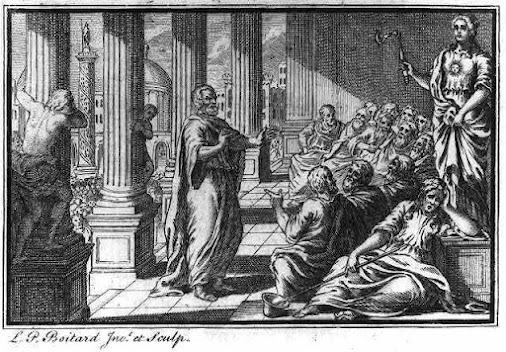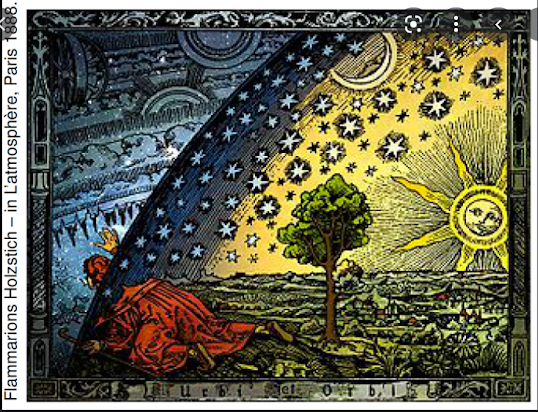The Philosophical Vocation - Plato's "Apology" Paragraphs 20-24 - and Some Personal Thoughts
Being Is Mysterious
In Plato's famous work, the Apology, we get a glimpse into Socrates' backstory as he seeks to defend himself during his trial. Socrates explains the set of events which set into motion his mission and search for wisdom. It all started when a friend of his, Chairephon, went to the Delphic Oracle and asked the Pythia if anyone was wiser than Socrates. (The Delphic Oracle was a place in Ancient Greece where people could go to contact the god Apollo by bringing gifts to his oracle, a woman with the title Pythia. In return she would potentially give you a pronouncement from Apollo as she was possessed by his spirit. Check out this great BBC In Our Time episode on the topic, https://www.bbc.co.uk/programmes/b00txj8d.)
The Pythia responded that Socrates was the wisest in actuality. Socrates was shocked to hear this prophecy because he knew he wasn't wise. But at the same time, Apollo cannot lie about something like this. Therefore, Socrates had to set out to investigate if the oracle was true by visiting people who had the reputation for wisdom in their society, and therefore either prove or disprove Apollo's claim. "When I heard of this reply I asked myself: 'Whatever does the god mean? What is his riddle? I am very conscious that I am not wise at all; what then does he mean by saying that I am the wisest? For surely he does not lie; it is not legitimate for him to do so.' For a long time I was at a loss as to his meaning; then I very reluctantly turned to some such investigation as this: I went to one of those reputed wise, thinking that there, if anywhere, I could refute the oracle and say to it: 'This man is wiser than I, but you said I was.'"
Socrates Sets Out to Find the Wisest
The first person that Socrates went to was a politician who was reputed for wisdom. Having spoken to the man, Socrates realized that he certainly did not possess wisdom, but neither was he willing to admit that he did not when Socrates confronted him. Rather, the man and the crowd around them, became upset at Socrates. Going away, Socrates admits that maybe neither of them know anything of wisdom, but at least Socrates admits that he doesn't know anything whereas the politician refused. Socrates decides that he must continue this mission and seek out others who are known for their wisdom, supposedly.
Therefore, he then goes to poets to seek wisdom. The poets are popular for their skills of composition, creating their beautiful poems and plays. Socrates begins to ask them the meanings of their most skillful works, but they are at a loss to explain them. Actually, their followers were able to explain the meaning of them better than their own authors. Socrates then realizes that the poets compose these works by some innate skill, not out of wisdom or knowledge, so they too lack the wisdom that everyone thought they had. "At the same time I saw that, because of their poetry, they thought themselves very wise men in other respects, which they were not." Therefore, likewise with the politicians, Socrates at least realized that he was wiser than the poets because he admitted his lack of wisdom.
Finally, Socrates goes to the craftsmen of Athens, and he admits that in terms of their craft they knew many wonderful things and skills. But their mistake was the same as the rest of the groups, because they were good at one thing, they assumed that they were knowledge and wise about many things, which was certainly false. Therefore, Socrates concludes that even though they were all good at some particular skills, their pride blinded them for having any wisdom. Thus, Socrates concludes that he would rather recognize his lack of wisdom, than be blinded like they were. "...so that I asked myself, on behalf of the oracle, whether I should prefer to be as I am, with neither their wisdom nor their ignorance, or to have both. They answer I gave myself and the oracle was that it was to my advantage to be as I am." Likewise, in an ironic twist of discovery, Socrates walks away with an understanding that the more prideful and popular people become, the less likely they are to actually be wise. "...in my investigation in the service of the god I found that those who had the highest reputation were nearly the most deficient, while those who were thought to be inferior were more knowledgeable."
He is Wise Because He Knows that He Knows Nothing
Socrates' conclusion is not that he was really wiser than the people he questioned, though the bystanders may have thought he was claiming to be. Rather, the conclusion is that Apollo was right, Socrates is wisest because at least he admits that he knows nothing at all. "What is probable, gentlemen, is that in fact the god is wise and that his oracular response meant that human wisdom is worth little or nothing, and that when he says this man, Socrates, he is using my names as an example, as if he said: 'This man among you, mortals, is wisest who, like Socrates, understands that his wisdom is worthless.'" Thus now Socrates understands the god's oracle, but he will not stop searching out men who have the reputation of wisdom so that he may learn something. 1
Personal Thoughts on Philosophy
Now upon reading this, it may seem strange that Western civilization has looked up to Socrates so much given that he knows that "he knows nothing of any or little value." Why is he then thought of as the father of Western philosophy? Isn't philosophy about knowing things about reality, after all? What good is such a statement of being wise because one will admit that they know nothing of wisdom? Well I think Socrates hits upon the fundamental truth of the philosophical enquiry. Fundamentally, philosophy is a stepping out into the dark. It is the building of a bridge to a place in which its conclusion is not fully clear. It is the pushing out into the unknown in hopes of finding salvation. The human experience is at its core ... a mystery.
What is reality? What am I? Where did everything come from? What's the ultimate purpose of things? These are questions which come with no fully fleshed out and explained answers at birth. We live these questions every day, and in our experience of the mystery of being we begin to formulate answers along the way. Philosophy, then, is an attempt to give words to this experience. To codify a system which can systematically help us understand reality more deeply. Thus the beginning of this search is the wisdom to know that we don't know much at all. Socrates is the father of Western philosophy because he embodies the spirit of the philosophical endeavor, the search after truth. This endeavor has carried on in a continuous conversations spanning the last 2,600 years. Do we understand more about the mystery of being now than before, of course. But the journey musn't stop. It must be a continued wrestling with being itself to give up its mysteries.
The Similarity Between Philosophy and Theology
I am reminded too of this truth as a Catholic. The Catholic faith recognizes that even with God directly communicating with the human race, that there is still a mystery to the being of the spiritual world and our interaction with it. We call these the "mysteries of faith." For example, God becoming man in Christ Jesus and saying, doing, and establishing everything that he did on earth, what is called the "deposit of faith." This deposit is so rich that, just like philosophy, the discipline of theology is conversation that has also lasted thousands of years. A conversation that has authoritative guides in the magisterium, but nonetheless theologians struggling to put together a coherent intellectual system in order to unpack these mysteries and fully comprehend their depth. Theology requires a developed philosophical system as its ground work, allowing it to be more fully understood.
Not only are those historical events mysteries, but the Church also operates by a "mysterious system." In the Western Church we use the word "sacraments," but in the Eastern Church they use the word "mysteries" instead of sacraments. In all of the Church's liturgical rites, in which physical rituals and symbols are used as Christ taught us to encounter the divine through them, this same mystery is lived. For example, in baptism we experience having water poured over us and being anointed with oil, yet through this something we cannot fully comprehend happens, we are cleansed of sin and filled with the Holy Spirit. This is true of all the sacramental rites.So the theological journey to God is not dissimilar to the philosophical journey towards the true essence of being. This is a mysterious life that we live. The truest nature of things is not something that gives itself up easily. Thus, we must like Socrates, continue to search for wisdom as our life's goal. But finally we also, like Socrates, must be resigned in that doing philosophy is only practice for the real thing. It is only in death that the veil is removed, and that we will encounter being as it is. The mystery will be unveiled.
"For we know partially and we prophesy partially, but when the perfect comes, the partial will pass away. When I was a child, I used to talk as a child, think as a child, reason as a child; when I became a man, I put aside childish things. At present we see indistinctly, as in a mirror, but then face to face. At present I know partially; then I shall know fully, as I am fully known. So faith, hope, love remain, these three; but the greatest of these is love."
-------------------







Comments
Post a Comment